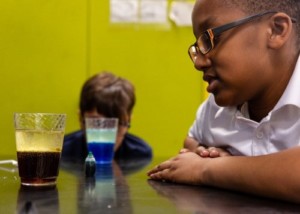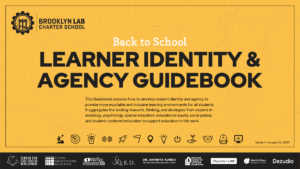Returning Joy to Teaching & Learning
Key Points
-
Too many school-based reform efforts continue to have educators implicitly standing with the standards against the students.
-
Pivot your perspective for a moment to the opposite.
-
What does a school where its educators stand with the students against the standards look like?

This is the second of a three-part series on valuing learner time.
First, I want you to think about those times as a student or educator when you felt joyful in a classroom learning experience. My hunch is you recall coursework that you were drawn to or felt a certain competence in. You may also recall that teacher whose passion and love for their subject and their desire to get you to love it pulled you in. As an educator, it is those times when you get to that unit you really love. I’d place a healthy bet that the farther you got into your undergraduate major, the more interesting it all became to you.
Now, think about those times as a student or educator when the opposite was true. It was likely coursework you felt incompetent in, saw no relevance, or had no interest in. It was the teacher who was either as bored with the subject as you or was so interested in being “rigorous” and “tough” that they cared little about having a meaningful relationship with their students.
Let’s tackle a pesky problem that gets scant attention in today’s school reform-based conversations. The fact that many, if not most, high school classes are geared to introduce pre-major students to important theories, concepts, and content so they are “ready” for college. It’s what AP and IB courses do. It’s what advanced courses do. In fact, the only place it may not happen is in remedial courses although it’s usually just a slower and less-deep version of the college-prep curriculum.
Think for a moment about the students you taught in your career. How many went on to major in the subject you taught? As an English teacher, I know of two former students who majored in English in college and there are likely a few more I don’t know about. My colleague who teaches physics says he doesn’t have a single student who went on to major in physics, yet most of the physics he was asked to teach students he didn’t deal with until he was an undergraduate senior or in his postgraduate studies.
Let’s sit with this important fact: the overwhelming majority of the students you teach are not going to major in the subject you’re teaching. This begs an important question: What is the cost of being “rigorous” with standards and content widely focused on preparing students for college curriculum when most of the students staring back at you have no interest in pursuing this content area in college, if they even go to college? I posit that the cost of this approach has been that a great number of students have developed an aversion to the subject and actually try to NOT learn much about it. Think about the number of students who claim to hate math and science, who refuse to read for pleasure, or who get hives at the mention of history. Isn’t it our primary job as educators not to snuff out the love of learning and curiosity in our students?
What does a school where its educators stand with the students against the standards look like?
Trace Pickering
As an English teacher who now realizes most of his students won’t go on to major in American Literature, what must I do to help students appreciate and feel like they can engage in literature and reading? I want students to “see” English in their science, math, sports, history, business, etc. I want students to enjoy and be able to draw learning and/or insight from reading whatever it is they enjoy. And I want that small handful of students who jam on American Literature like me to be able to nerd out to their heart’s content.
As a science teacher, don’t I want a classroom full of students who know enough science to ask good questions and know how to make informed opinions by discerning good research and data from the bad? Don’t I want them all to understand that science impacts us all every day? Like the science behind a delicious and healthy meal, the consequences of maintaining the standard of a beautiful suburban lawn, and understanding why global warming is a thing?
Too many school-based reform efforts continue to have educators implicitly standing with the standards against the students. Pivot your perspective for a moment to the opposite. What does a school where its educators stand with the students against the standards look like?
So what’s the first possible step? Talk to the students. Figure out their current perceptions about your subject. Like what many of you had to do during the pandemic, find out what it is you really want every student to walk away knowing. Those things that every student needs to know no matter their future path? Now, gear your classroom to those students and help them meet standards best aligned to what you want for them. Be honest about the standards that exist purely to prepare pre-majors and make sure your students understand this. Give meaningful and deep work to that handful of students planning to use your discipline in a college major. This may actually be the most positive step towards truly personalized learning you can take.
What will you end up with? A more joyful teaching and learning experience and students who come to place a higher value on the important elements of your discipline in their lives.








0 Comments
Leave a Comment
Your email address will not be published. All fields are required.